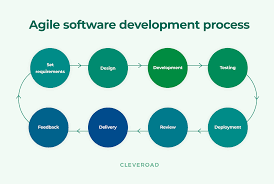Mastering the Art of Software Engineering: Building the Future with Code
Software Engineering – Building the Future of Technology
Software engineering is a dynamic and rapidly evolving field that plays a crucial role in shaping our modern world. It encompasses the design, development, testing, and maintenance of software applications and systems that power everything from smartphones to complex enterprise solutions.
The Importance of Software Engineering
In today’s digital age, software is at the core of almost every aspect of our lives. From communication and entertainment to healthcare and transportation, software engineering is instrumental in creating innovative solutions that drive progress and efficiency.
Key Principles of Software Engineering
Software engineering follows a set of key principles to ensure the development of high-quality, reliable, and scalable software products. These principles include:
- Requirement Analysis: Understanding and defining the needs and specifications of the software.
- Design: Creating a blueprint for the software architecture and user interface.
- Implementation: Writing code based on the design specifications.
- Testing: Verifying that the software functions correctly and meets requirements.
- Maintenance: Updating, enhancing, and fixing issues in the software over its lifecycle.
The Role of Software Engineers
Software engineers are highly skilled professionals who possess expertise in programming languages, algorithms, data structures, and problem-solving. They collaborate with stakeholders to understand requirements, develop solutions, and ensure that software products meet quality standards.
The Future of Software Engineering
As technology continues to advance at a rapid pace, the field of software engineering will play an increasingly vital role in driving innovation across industries. Emerging trends such as artificial intelligence, cloud computing, Internet of Things (IoT), and blockchain present new opportunities for software engineers to create cutting-edge solutions that address complex challenges.
In conclusion, software engineering is not just about writing code; it’s about building the future of technology. By adhering to best practices, embracing innovation, and staying current with industry trends, software engineers are paving the way for a more connected and efficient world.
Top 9 Frequently Asked Questions About Software Engineering
- What is software engineering?
- What are the key principles of software engineering?
- What programming languages are commonly used in software engineering?
- How does software engineering differ from computer science?
- What roles do software engineers play in the development process?
- What are the steps involved in the software development life cycle?
- How important is testing in software engineering?
- What are some common challenges faced by software engineers?
- What trends are shaping the future of software engineering?
What is software engineering?
Software engineering is a specialized field that involves the application of systematic, disciplined, and quantifiable approaches to the design, development, testing, and maintenance of software systems. It encompasses a structured process that focuses on creating reliable, efficient, and scalable software solutions to meet specific user needs and requirements. Software engineering combines principles from computer science, mathematics, and project management to ensure that software products are delivered on time and within budget while adhering to quality standards. In essence, software engineering is the foundation of modern technology, driving innovation and shaping the digital landscape we interact with daily.
What are the key principles of software engineering?
One frequently asked question in software engineering is, “What are the key principles of software engineering?” The key principles of software engineering encompass essential stages in the software development lifecycle, including requirement analysis, design, implementation, testing, and maintenance. These principles guide software engineers in understanding user needs, creating a robust architecture, writing efficient code, ensuring functionality through rigorous testing, and providing ongoing support and updates to deliver high-quality software solutions that meet client requirements and industry standards. Understanding and applying these fundamental principles are crucial for developing reliable and scalable software products that drive innovation and success in the digital landscape.
What programming languages are commonly used in software engineering?
In software engineering, a wide range of programming languages are commonly used to develop diverse applications and systems. Some of the most popular programming languages include Java, Python, C++, JavaScript, and C#. Each language has its own strengths and is chosen based on factors such as project requirements, performance considerations, and developer preferences. Java is widely used for building enterprise applications, Python is favored for its simplicity and versatility, C++ is known for its performance and system-level programming capabilities, JavaScript is essential for web development, and C# is commonly used in Microsoft environments. Understanding the characteristics of these languages helps software engineers select the most appropriate tool for the task at hand.
How does software engineering differ from computer science?
In the realm of technology, a common question that often arises is how software engineering differs from computer science. While computer science focuses on the theoretical foundations of computing, algorithms, and data structures, software engineering is more practical in nature, emphasizing the design, development, testing, and maintenance of software applications. Computer science delves into the fundamental principles that underpin computing systems, while software engineering applies these principles to create real-world solutions that meet specific requirements and address user needs. In essence, computer science lays the groundwork for understanding computation, whereas software engineering translates this knowledge into tangible products and systems that drive innovation and progress in the digital landscape.
What roles do software engineers play in the development process?
In the development process, software engineers play essential roles that are pivotal to the success of a project. They are responsible for analyzing requirements, designing software solutions, implementing code, testing for functionality and quality assurance, and maintaining software systems post-deployment. Software engineers collaborate closely with stakeholders to ensure that the developed software meets user needs and business objectives. Their expertise in programming languages, algorithms, and problem-solving enables them to create efficient and scalable solutions that drive innovation and progress in the field of software engineering.
What are the steps involved in the software development life cycle?
The software development life cycle encompasses a series of key steps that guide the process of creating high-quality software products. These steps typically include requirements gathering and analysis, system design, implementation, testing, deployment, and maintenance. Each phase of the software development life cycle plays a crucial role in ensuring that the final product meets user needs, functions as intended, and can be maintained effectively over time. By following a structured approach to software development, teams can streamline their workflows, improve collaboration, and deliver solutions that align with industry best practices.
How important is testing in software engineering?
Testing plays a pivotal role in software engineering, serving as a critical quality assurance measure throughout the development lifecycle. It is essential for identifying and rectifying defects, ensuring that the software functions as intended, meets user requirements, and operates reliably. Effective testing not only enhances the overall quality of the software but also helps in reducing maintenance costs and mitigating risks associated with potential failures. By emphasizing thorough testing practices, software engineers can deliver robust and dependable solutions that instill confidence in users and stakeholders alike.
What are some common challenges faced by software engineers?
Software engineers often encounter a variety of challenges in their work, ranging from technical complexities to project management issues. Some common challenges faced by software engineers include managing tight deadlines while maintaining quality standards, dealing with changing requirements throughout the development process, ensuring effective communication and collaboration within multidisciplinary teams, debugging and fixing complex software bugs, adapting to new technologies and frameworks, and addressing scalability and performance issues as applications grow. Overcoming these challenges requires a combination of technical expertise, problem-solving skills, effective teamwork, and a proactive approach to continuous learning and improvement in the dynamic field of software engineering.
What trends are shaping the future of software engineering?
The future of software engineering is being shaped by several key trends that are revolutionizing the industry. Emerging technologies such as artificial intelligence, machine learning, cloud computing, Internet of Things (IoT), and blockchain are driving innovation and transforming how software is developed and deployed. These trends are enabling greater automation, scalability, and efficiency in software engineering processes. Additionally, practices like DevOps, agile development, and continuous integration/continuous deployment (CI/CD) are reshaping how teams collaborate and deliver software solutions rapidly and reliably. Keeping abreast of these trends is essential for software engineers to stay competitive and drive impactful change in the ever-evolving landscape of technology.












